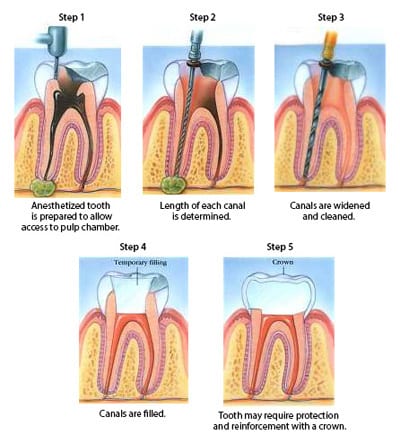
When Is Root Canal Treatment Needed?
Some causes of damaged tooth pulp that leads to root canal treatment include:
- Complications with a dental crown or filling – A deep filling or crown can cause the pulp tissue to become irritated. Usually, the irritation will heal, but sometimes the pulp tissue eventually dies.
- Deep decay – Untreated decay causes infection, inflammation, swelling, and pain. The antibodies and white blood cells that your body sends to fight the infection in the tooth pulp will further crowd and choke the pulp. An untreated infection will spread, form an abscess at the tip of the tooth root, and affect your jawbone and beyond if left untreated.
- Trauma – If a tooth cracks or breaks severely, the pulp can be damaged. In some cases, the pulp is left exposed to oral fluids and bacteria. Even if a tooth doesn’t chip or break, the impact can sever the tooth’s blood supply.
Some people wonder why they can’t just take an antibiotic to cure a tooth infection. The reason is that the inside of a tooth is a confined space where normal body functions for fighting infections will not work. When you have an infection in other parts of the body, antibodies and white blood cells are sent to the area to fight the infection. As a result, the area swells. But when the infection is inside your tooth, natural swelling in the confined space of your tooth kills the pulp tissue.
As the tooth pulp starts to try to swell, you’ll have a toothache. When the pulp dies, the pain can go away. At that point the infection begins to spread through the end of the root, causing a tooth abscess, which may or may not be painful. So to cure an infection inside of the tooth, the diseased or dead pulp tissue needs to be cleaned out and the canal space sealed.
How Do You Know If You Need Root Canal Treatment?
Although you may not experience all the signs and symptoms listed below, you might need root canal treatment if you have some of them.
- A bump in the gums near your tooth root that’s tender
- A severe crack or chip in a tooth
- A toothache
- Intense pain when you bite or chew
- Sensitivity to hot or cold that lingers more than a second or two
What Happens During Root Canal Treatment?

Dr. Theriot or Dr. Redhead will do the following:
- Numb your tooth
- Keep the area around the tooth isolated and dry
- Make a small access hole in the biting surface of your tooth and into the pulp chamber
- Remove the infected or dead pulp
- Clean and disinfect the tooth
- Shape the canals in your tooth
- Replace the pulp with a rubbery dental filler material
- Seal the tooth and protect it with a temporary filling
- Restore the tooth with a dental crown
Is It Painful?
Often, the tooth pulp is dead before root canal treatment begins. And if the pulp is dead, you can’t feel pain inside the tooth. Regardless, we numb the tooth before root canal treatment, and most patients don’t feel any pain at all. If dental visits make you nervous or you have difficulty getting numb, you can request conscious sedation for the procedure. After root canal treatment, you may feel sensitivity or tenderness in the tooth when biting.
Preventing the Need for Root Canal Treatment
How can you avoid the need for root canal treatment?
- Maintain good oral health at home to avoid tooth decay. Brush your teeth twice daily and floss daily.
- Schedule regular appointments for dental cleanings and exams for preventive care.
- If you play contact sports, wear a mouthguard to protect your teeth from trauma.
- Get defective fillings and crowns placed right away.
If you think you need root canal treatment, or if you’re interested in preventive care, schedule an appointment with Dr. Theriot or Dr. Redhead. Call us or complete our Request an Appointment form.

